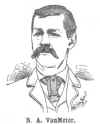where Naponee now stands, crossed the river at night, camped with Gordon and Castilo, buffalo hunters.
A few days before this the Indians had made a raid through the country and had stolen all the horses the settlers had.
He crossed from there to Deer Creek, thence east to Cedarville where he got breakfast the fourth morning.
At that time there was no settlers at Kirwin, and but one house in Cedarville.
The next day he killed his first buffalo on Deer Creek near where Phillipsburg was afterward built.
He was then looking for Jule's camp, failing to find it he returned east and spent the balance of the summer in Missouri; returned in the fall when he, Jule
and Wallace Spencer started from Gaylord up Bow Creek to hunt and trap. They made their first camp west of Sugar Loaf mound, and was in camp at
that place when the famous storm of November 17 of that year occurred, which was partially described in the biography of Jule.
They had no protection from the storm except a wagon street stretched over a pole.
On the second day they were out of provisions and barefooted, with snow two feet deep on a level.
They eat (sic) a beaver which the dog had rejected one week before. On the third day they killed two grouse; The fifth day was so stormy that they failed to get a fire, so they sat and held each others' feet to keep them from
freezing. On the seventh day they wrapped their feet in rags and started to Gaylord.
Baker froze his feet so badly the nails all came off. They found a hunter's camp, bought 25 lbs flour, and returned to camp.
On the tenth day Jule came in as previously stated. A few days later they moved west of Twin Mounds on Marsh Creek on land now owned by John Lunney.
Shortly after making camp here Spencer concluded he had enough of hunting and trapping and joined a party of hunters who were going east; he went to Iowa where he now
resides. Baker and Jule remained here until Aprll 1872, but were many times short of provision, living for some days in
January on the remains of a deer after a mountain lion had made a feast of it.
Baker crossed the  plains that summer, returned to Iowa in the fall, was married in April 1873, returned to Norton county in May 1875, settled in Leota township on sec. 24, town 3 range 26, the same land is now owned by Jule.
He has five children all born in Norton county; Charley, born December 25, 1875, Frank and Mabel were born in 1877 and 1879, Jacob in 1881, and Dora in 1883.
He was elected Register of Deeds on the Leota ticket in 1876, served one term but never moved to the county seat, he moved the office to his dugout and would come down occasionally and attend to the business of the office.
He built a saw-mill in 1879, but the dry years of '80 and '81 demoralized the people that it did not pay, and it was allowed to go to ruin.
Baker went on his last buffalo hunt in 1880 with I. S. Hall, John Hucker and Jule; killed nine buffalo near the Colorado state line; he has two robes yet from buffalo killed on that hunt.
Antelope were plenty for some years, Baker being a good shot always had fresh meat while they stayed.
He was elected county commissioner in 1889 an office he filled with distinction, served three years, was elected on the Republican ticket by a
good majority, defeating the Union Labor candidate. plains that summer, returned to Iowa in the fall, was married in April 1873, returned to Norton county in May 1875, settled in Leota township on sec. 24, town 3 range 26, the same land is now owned by Jule.
He has five children all born in Norton county; Charley, born December 25, 1875, Frank and Mabel were born in 1877 and 1879, Jacob in 1881, and Dora in 1883.
He was elected Register of Deeds on the Leota ticket in 1876, served one term but never moved to the county seat, he moved the office to his dugout and would come down occasionally and attend to the business of the office.
He built a saw-mill in 1879, but the dry years of '80 and '81 demoralized the people that it did not pay, and it was allowed to go to ruin.
Baker went on his last buffalo hunt in 1880 with I. S. Hall, John Hucker and Jule; killed nine buffalo near the Colorado state line; he has two robes yet from buffalo killed on that hunt.
Antelope were plenty for some years, Baker being a good shot always had fresh meat while they stayed.
He was elected county commissioner in 1889 an office he filled with distinction, served three years, was elected on the Republican ticket by a
good majority, defeating the Union Labor candidate.
He would have been renominated and elected practically by acclamation in 1892 but some of his friends started the story that he would not accept, so the convention nominated Charles E.
Hatcher. He purchased the John Wallace mill 2 1/2 miles west of town in 1883 and has operated it ever since.
The convention to nominate county officers to be voted for at the general election of 1872 met at Norton, September 30.
This date is positively remembered
|